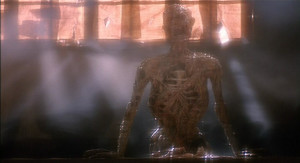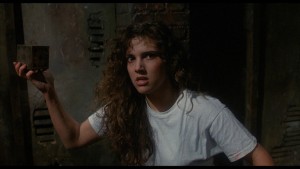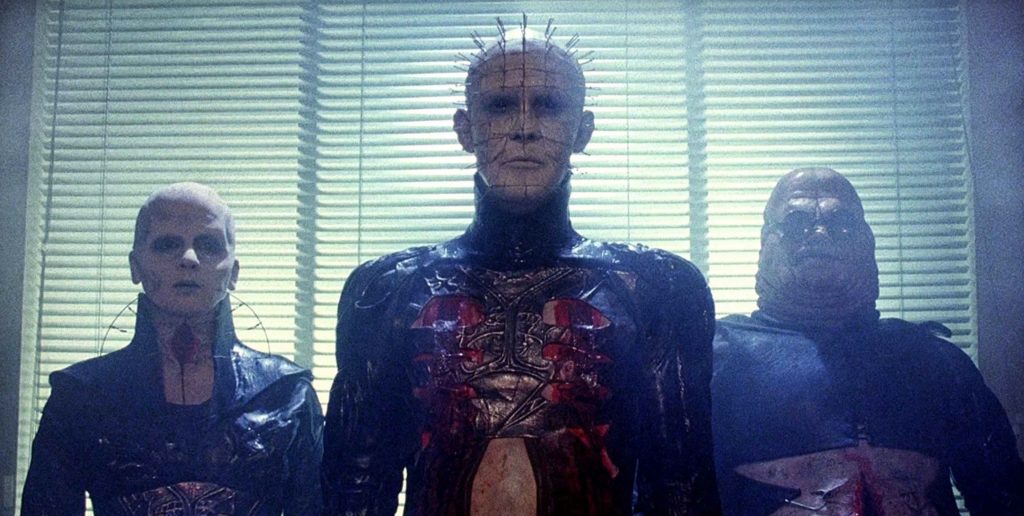The sin of “Hellraiser” is that it offers up a sadistic premise that it doesn’t deliver. Decidedly, the film’s opening is desperate and scary, featuring an unlucky man Frank (Sean Chapman), who meets his seeming end while playing with a magic cube meant to summon demons. And seeing a legion of “Hellraiser” films lining video store shelves as a kid, the film’s villain, Pinhead, always seemed like a vicious and evil being. However, in the franchise’s first film, “Hellraiser,” released in 1987, we see little of Pinhead, and little that offers up coherent scares. The film has a great atmosphere and typical 1980’s settings. However, it violates the basic rule of horror films by explaining away all the terror, and not giving enough screen time and horror to its main antagonist.
The basic premise here is that a couple, Julia and Larry (Andrew Robinson, Claire Higgins) buy a house, but soon after Julia discovers a hideous creature hiding in an upstairs room. Before this discovery, we see their marriage is crumbling, most likely from Larry’s disinterest and the fact that Julia had cheated on Larry years prior with his own brother. However, “Hellraiser” doesn’t really divulge much about this; for instance, does Larry know? Have they worked it out? Answers aren’t forthcoming. At any rate, Julia discovers the creature in the attic, which turns out to be Larry’s brother Frank, who has escaped from the demon’s hell. He now needs Julia to provide him with human sacrifices to complete his body before the Cenobites, Hell’s keepers, come to look for him.
 What “Hellraiser” does have going for it are frightening set pieces, most namely the couple’s house,which is falling apart, rife with broken pipes, old wood, and insects and the like infesting some parts. There’s also a perpetual ray of light seeping in through half-drawn curtains, and the way the whole wooden house seems cast in constant twilight (even during the day), which makes the whole thing seem so much scarier than it should. The film comes from the mind of Clive Barker, horror aficionado, responsible for such other attempts as “Candyman” or “Nightbreed.” And indeed “Hellraiser” is based off a novella, “The Hellbound Heart;” but a quick read of the synopsis on Wikipedia provides more details about Frank’s horrors among the Cenobites than this entire movie does.
What “Hellraiser” does have going for it are frightening set pieces, most namely the couple’s house,which is falling apart, rife with broken pipes, old wood, and insects and the like infesting some parts. There’s also a perpetual ray of light seeping in through half-drawn curtains, and the way the whole wooden house seems cast in constant twilight (even during the day), which makes the whole thing seem so much scarier than it should. The film comes from the mind of Clive Barker, horror aficionado, responsible for such other attempts as “Candyman” or “Nightbreed.” And indeed “Hellraiser” is based off a novella, “The Hellbound Heart;” but a quick read of the synopsis on Wikipedia provides more details about Frank’s horrors among the Cenobites than this entire movie does.
What is a shame about “Hellraiser” is it squanders the awesome atmosphere of its evil house (where indeed Frank did summon the Cenobites in a ritualistic room upstairs), and seems content to over-explain all its happenings. Frank needs Julia to bring him fresh victims, which she does without question, murdering unlucky guys upstairs, which Frank soon consumes. The film does foster an ominous and almost desperate feeling during some parts, such as in highlighting Julia’s unhealthy obsession with Frank, whom she still lusts for despite her marriage to Larry, but overall much of the film’s fright is just explained away. We know why she’s killing, and we know that Frank’s disgusting form (basically he’s skeleton and muscle with stripped skin) will eventually be completed. But since we know exactly what is happening, it’s no longer scary.
 “Hellraiser” also, in certain parts, becomes uber-ridiculous, asking the audience to perform jumps in reason to follow its path. The film presents an awesome performance in that of Ashely Laurence, who plays Larry’s daughter, but backstory into their lives, or her seeming hatred of Julia, aren’t explored at all. Likewise, Barker’s truly disturbing ideas of a world where hedonistic pursuits of extreme pleasure lead to unbearable pain are not explored here, mentioned only in a brief flashback that fails to instill the horror it needs to. And the ending of the film, involving Pinhead and the Cenobites’ inadvertent summoning to Earth – as well as some subsequent horror that ensues – seems short-lived and rushed. There’s something unnerving about the concept of a hellish universe operating just beyond our reach. Alas, we simply do not see enough of the Cenobites’ realm, or their tortuous pursuits, to be afraid of them. The film’s conclusion clambers around like a disjointed dream; instead of being horrific, it’s just kind of confusing.
“Hellraiser” also, in certain parts, becomes uber-ridiculous, asking the audience to perform jumps in reason to follow its path. The film presents an awesome performance in that of Ashely Laurence, who plays Larry’s daughter, but backstory into their lives, or her seeming hatred of Julia, aren’t explored at all. Likewise, Barker’s truly disturbing ideas of a world where hedonistic pursuits of extreme pleasure lead to unbearable pain are not explored here, mentioned only in a brief flashback that fails to instill the horror it needs to. And the ending of the film, involving Pinhead and the Cenobites’ inadvertent summoning to Earth – as well as some subsequent horror that ensues – seems short-lived and rushed. There’s something unnerving about the concept of a hellish universe operating just beyond our reach. Alas, we simply do not see enough of the Cenobites’ realm, or their tortuous pursuits, to be afraid of them. The film’s conclusion clambers around like a disjointed dream; instead of being horrific, it’s just kind of confusing.
All in all, “Hellraiser” does raise some questions about sex, lust, and the nature of evil, and, indeed, Pinhead is not the film’s only villain aside Julia who does monstrous things in the name of lust. However, a lack of coherent narrative and underdeveloped roles leave one scratching their head as the film ends. “Hellraiser” is kind of a letdown, and I was hoping it was going to be so much more.
– by Mark Ziobro


